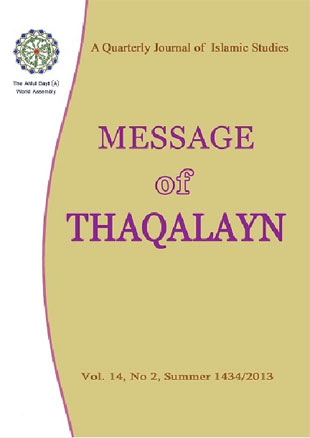فهرست مطالب

Message of Thaqalayn
Volume:14 Issue: 2, Summer 2013
- تاریخ انتشار: 1392/06/17
- تعداد عناوین: 8
-
Pages 7-22Fasting is a practice that has always been recommended by health experts throughout history, and is practiced in religions other than Islam, such as Christianity, Budhism, and Hinduism. This article delves into the spiritual and epistemic features and benefits of fasting; it purges the root of lust, strengthens a person’s will power, and improves a person’s ability to contemplate. A person’s fast comes with restraining himself from immoral thoughts and actions, and has a lasting effect. Additionally, several narrations are offered to reveal its significance as well as its effects on people in this world and in the next.
-
Pages 23-30Communicating with the divine can take various forms; among these, the most powerful heart-to-heart conversation is found in the spiritually-potent whispered prayer known as Munaajaat Sha’baaniyyah. What follows in this piece is a glimpse of the concept of forgiveness in the whispered prayer, and a description of its various forms, that is, the various types of seeking forgiveness and accepting an apology, as well the reasons for why people accept apologies from one another. Lastly, how to address Allah when seeking repentance will be addressed. Our asking for forgiveness from Him should be such that we plead with Him until He accepts our apology. If a person wants Allah’s forgiveness and mercy we are to manifest this trait of Allah – the Oft-Forgiver – within ourselves; and in order for Allah to forgive us, then we need to forgive others as well.
-
Pages 31-42Tanbih al-Khawatir wa Nuzhat al-Nawazir, better known as Majmua (Collection) of Warram, is a celebrated work on moral and ethical doctrines of the Shi‘a school of thought. Written by a renowned and reliable scholar, this book enjoys a prominent position among the books on ethics and etiquette of pious people. In addition to the biography of the author and various names of the book, this paper presents a general outlook of its authenticity and content, and offers citations of its narrations in other hadith collections.
-
Pages 43-62Part I of this series focused on the Islamic seminaries of Basra, known for its role in the science of Hadith; Baghdad, the center of advancements in jurisprudence, theology, and deductive reasoning; and Najaf, one of the most important institutions of academics and ijtihad in the history of Shi‘a academia. This part presents information on the revival of ijtihad in the Seminary of Hillah and introduces its prominent scholars, such as Najib al-Din Muhammad Ja’far, Muhaqqiq al-Hilli, Sayyid bin Tawus, and Allamah Hilli. It also introduces the Seminary of Kazemayn – where the renowned Shaykh Mufid studied; the Seminary of Samarra, where Shi ‘a theology was taught, along with alerting the Shi‘a of their political responsibilities and providing them with a culture of supplication (dua) and pilgrimage (ziyara); and the Seminary of Karbala, where the highly proficient scholar Abdullah bin Ja’far Humayri – the teacher of renowned scholars Ali bin Babiwayh and Muhammad bin Ya’qub Kulayni – studied.
-
Pages 63-80The word light (nur) has been applied in the religious texts to a variety of instances. These instances involve a wide spectrum of beings whose one extreme is the visible light, whilst the other extreme is the divine Essence. Entities situated between these two extremes such as intellect, knowledge, faith, divine messengers and their successors, guidance, and the like, have also been referred to as light. Nonetheless, the possession of light by all other beings is by virtue of the perpetual Essence of God.
-
Pages 81-96Salam (Peace) is a Qur’anic term with a wide range of deep meanings and various practical aspects and manifestations. This divine word is a name of Allah, and many hadiths have been reported from the Holy Prophet and Imams regarding its meanings. In many religious texts, including prayers, ziyarahs, and social interactions, its manifestations are clearly seen. As the best deed and act of worship and the most beautiful display of servitude to Allah, prayer has some elements, including Salam. This article first identifies and summarizes the most important meanings of Salam on the basis of authentic Arabic and Persian dictionaries. Next, on the basis of these meanings, the most significant implications will be investigated, namely, the philosophy of Salam in Prayer.
-
Pages 97-122In the present day, a great deal of research is being done on how to eat as well as eating etiquette for people’s wellbeing. This article touches upon Prophet Muhammad’s eating and drinking habits and etiquette, including the kinds of food he ate, the amount eaten, when he ate, and with whom. Other aspects of eating etiquette, such as beginning a meal with Allah’s name, ending it in praising Him, hygiene, and avoiding wastefulness are also considered. Since the Prophet was chosen by Allah to deliver His message to the people through teaching them how to live and eventually reach perfection, he is the perfect model to be followed in every aspect of a person’s life.
-
Pages 123-134In Shi‘i Islam, it is necessary for a society to have a pious, knowledgeable, wise, and infallible guide who will lead the Muslim society after the Prophet’s death to present truth Islam. Having such a leader is a grace of God. While Part V of this series studied a group of verses that refer to the concept of witness in the Qur’an – who was none other than Imam Ali – together with his roles and merits, Part VI offered authentic hadiths that refer to the legitimacy of Imam Ali’s leadership, such as the Hadith of Manzilah, the Hadith of Wilaya, and the Hadith of Ghadir. This last part focuses on the concept of wilayah, and specifically verses in the Qur’an that pertain to wilayah in legislation and creation.

